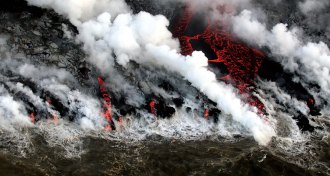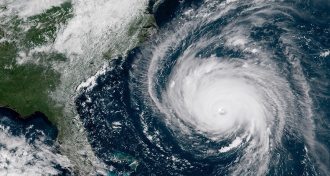Search Results
Tracing tracks and guessing gaits
Students will use what they know about physics and human range of motion to analyze classmates’ trackways and infer how their classmates made the tracks.
Step into the shoes of a scientist studying ancient locomotion
These discussion prompts encourage students to apply their knowledge of experimental design.
Following an ancient path
Students will answer questions based on the Science News article "Robot re-creates a tetrapod's moves."

Kilauea Curiosities
This guide covers what scientists have learned from the eruption of Hawaii's Kilauea volcano and the tools used to monitor volcanoes.
Volcanoes, erupting now?
Students will review volcano monitoring data and learn how to use it to predict possible volcano behavior.
Explore volcanic eruptions, and their devastating aftermath
These discussion prompts explore volcanic explosivity and collapse, the ecosystem and health effects of eruptions and how to keep people safe during natural disasters.
Zooming in on the Kilauea volcano
Students will answer questions based on the Science News article "Kilauea curiosities."

The periodic table turns 150
This guide reviews the history and development of the periodic table and explores the periodic table as a scientific model.
Now trending, the Periodic Table
After watching videos about the periodic table, students will identify general patterns in the table.
Go beyond Mendeleev’s model
These discussion prompts encourage students to think about the principles and purposes of scientific models in all areas of science and engineering.
Getting to know the periodic table
Students will answer questions based on the Science News article "The periodic table turns 150."

2018 Year in Review
This guide reviews the biggest science stories of 2018, as reported by Science News.